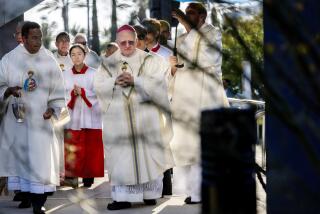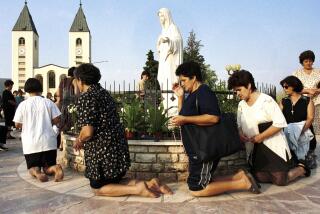Vatican Plans to Make Public Its Finance Reports
- Share via
WASHINGTON — An American cardinal said Wednesday that the Vatican, suffering from growing annual budget deficits, is opening its books to outside auditors and will soon make its financial statements available publicly for the first time.
“The key word in all this is credibility,” Philadelphia’s Cardinal John Krol told reporters after addressing the annual meeting here of the nation’s Roman Catholic bishops.
The changes in Vatican financial policies announced by Krol are ones he said he has sought for six years as a member of the Council of Cardinals, an international group asked to try to resolve the Vatican’s debt problems. He said the current annual deficit is about $59 million, more than double what it was six years ago.
However, Krol left it unclear how detailed the financial reports, to be mailed out before the end of the year, will be.
Policy Statements Adopted
Meanwhile, the nearly 300 bishops, whose four-day meeting will end today, unanimously adopted two policy statements Wednesday. The first condemned the trend--drawing Catholic opposition around the country--to establish contraceptive-dispensing clinics on public school grounds. The bishops contended that the clinics “undermine the moral and religious values that parents try to impart.”
The second was a lengthy National Pastoral Plan for Hispanic Ministry, which urges dioceses, among other things, to establish small groups for Latinos within parishes to “integrate” them into church life and thus combat the proselytizing inroads of small fundamentalist groups.
Archbishop Patrick Flores of San Antonio said that Latino Catholics who fall away from the church invariably tell him, “We didn’t get nourishment and recognition. We’re just lost there.”
The heavily Latino Archdiocese of Los Angeles approved a similar pastoral plan last year, but Auxiliary Bishop Juan Arzube said in an interview here that its implementation still lies ahead. The U.S. bishops’ action “gives further impetus to the plan at the diocesan level,” Arzube said.
On the matter of the Vatican’s plans for financial disclosure, it was apparent from Cardinal Krol’s remarks that the 15-member Council of Cardinals has sought to gain the confidence of would-be American benefactors.
Krol said at a news conference, “We have auditors in the offices (of the Roman Curia) but they are in the employment of the Vatican. We recently invited four people from the outside for the purpose of verification or affirmation,” he said, referring to unnamed auditors selected by Cardinal John O’Connor of New York.
Krol told a news conference that the Vatican last March had sent confidential copies of its audit for 1986 and a budget estimate for 1987 to bishops, but that new versions will be mailed within weeks to U.S. bishops without any restrictions on public release.
The bishops will also receive a copy of a separate audit of the Vatican City State, which Krol said is able to cover its budget.
Krol and several other influential American prelates held a dinner party here Sunday for about two dozen wealthy American laymen to explain the Vatican’s financial plight.
The main purpose, church officials said, was to explore the idea of creating a U.S.-based endowment fund to offset the deficit by making designated grants to the Vatican.
Source of Idea
The buffet dinner was hosted by Archbishop Pio Laghi, the Vatican’s diplomatic representative in Washington, who said the idea came out of the United States. “We hope some other countries might do the same,’ Laghi said.
Los Angeles Archbishop Roger M. Mahony attended the dinner with two other Southern Californians, William Wilson, former U.S. ambassador to the Vatican, and Daniel J. Donohue, president of the Dan Murphy Foundation, which gave $500,000 earlier this year to defray the archdiocese’s papal visit costs.
In an interview, Mahony said, “I think the goal would be not to send, say, $10 to $15 million a year to Rome for the deficit reduction, but to set up an endowment in this country, then ask the Holy Father for specific work in the Vatican which we can support.”
Peter’s Pence, an annual collection sent to Rome from the world’s 840 million Catholics, sufficed for Vatican expenses until about 1960, Krol said. Increased travel and lodging for an expanded church bureaucracy, inflation and pension and salary costs have led to the annual deficits, he indicated.
A major problem, Krol told the bishops in a colloquial manner, is “we ain’t got no pension plan.” He said that more than 50% of the operational costs are used for salaries and pensions of Vatican employees.
Second Yearly Increase
The Council of Cardinals reported in March that the 1986 Peter’s Pence collection totaled $32 million, which fell far short of covering the year’s deficit. However, a source said the total represented an increase for the second year in a row.
Contributions fell in 1984, reflecting, some Vatican observers believe, widespread disappointment over the involvement of the Vatican Bank in Italy’s worst bank scandal, the $1.3-billion collapse of the Banco Ambrosiano. The bank, formally known as the Institute of Religious Works, does not figure in the Vatican budget or fall under the jurisdiction of the Council of Cardinals.
More to Read
Sign up for Essential California
The most important California stories and recommendations in your inbox every morning.
You may occasionally receive promotional content from the Los Angeles Times.










